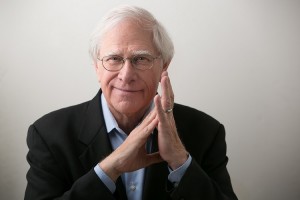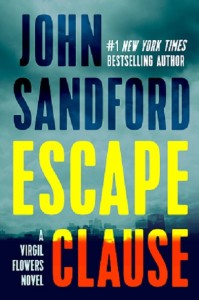John Sandford is the pseudonym for the Pulitzer Prize-winning journalist John Camp. After turning to fiction, he’s written ma

The writer John Sandford (USA) by Beowulf Sheehan, July 9, 2015, New York, New York. Photograph © Beowulf Sheehan
ny bestselling books, including twenty-six Prey novels, the most recent being Extreme Prey. He’s also written four Kidd novels; nine Virgil Flowers novels; three standalone novels, and three YA novels coauthored with his wife, Michele Cook.
Escape Clause, finds Virgil Flowers involved in a case that begins at the Minnesota Zoo. Two rare Amur tigers have vanished from their cage, and authorities think they’ve been stolen for their body parts which are prized in traditional Chinese medicine. People will take extreme measures to get them, and Virgil Flowers must race the clock in an effort to locate and save the tigers. But he must also deal with a string of murders that appears to be connected to the missing tigers.
How did the idea of missing tigers and their body parts come to you?
We have a lot of National Geographic magazines at home and I suppose the germ of an idea came from them. My wife has some books on alternative medicine, and think it ended up as a diffuse melding from those two sources.
Virgil Flowers is a fascinating character. Will you give us a brief description?
He’s a smart man who’s not all that comfortable with his role in law enforcement. He’s a tall guy with long blond hair. He was a baseball player in college and graduated with a degree in ecological science. He also writes occasional magazine articles on outdoor topics.
How has he evolved to the point where he is in Escape Clause?
He used to chase a lot of women, but for the last couple of books, he has had a permanent girlfriend…which may be a mistake [Laughter]. He hasn’t been terribly successful with women. He’s been married and divorced three times and none of those marriages lasted more than a year or so. He still maintains good relationships with his ex-wives, but he’s had chronic problems with women. I don’t know what’s going to happen with this relationship with his current girlfriend.
Why did you say his having a permanent girlfriend may be a mistake?
Because I have a lot of female readers and many of them have come up to me at readings and have expressed their dissatisfaction with that fact. [Laughter]. The problem with Virgil is he likes women—not in a predatory way—he enjoys their company, but he’s also sexually attracted to them, and then…Virgil falls in love.
I think women readers like that he doesn’t take women for granted. It all seems kind of odd, even to me [More laughter].
I couldn’t help but notice that Escape Clause has significant elements of humor. Tell us about that.
When I was a newspaper reporter, I heard the funniest stories from cops. Many cops have good senses of humor. You almost have to have that to do the job. Some very weird and funny things happen on the street. Virgil has a sense of humor and I try working that into the books. Many of the things that happen in the books are more stupid than just plain funny. If you work with cops for a long time, you realize that a lot of the people they come in contact with are really dumb. And they do really dumb stuff, repeatedly. Many times it leads to tragedy, but some of these stories are really a complex mixture of comedy and tragedy.
Do you plot the elements of a story in advance or let the plot evolve as you write?
The plot pretty much evolves on its own. When I’ve tried to outline ahead of time, it hasn’t worked for me. It makes the pace of the book way too fast. I prefer a kind of cinema verite quality to the novel, which comes from struggling with the novel’s direction—you know, hitting a bunch of dead-ends because detectives are trying to figure out a complicated situation.
When I outline a plot, things get solved really quickly. The books are around a hundred-thousand words long, and around the seventy-five-thousand-word point, I tend to outline so I can rush up to the climax.
What’s the most important lesson you’ve learned about writing?
I’m learning about writing all the time. Every time I write a book it feels like I’m doing it for the first time. I think the most important lesson for first-time writers is the value of persistence. I have little tricks to keep me going—I write down how many words I write every day. I do that because it tells me I’m making progress and I’ll get to the end of this project if I just persist. You can get lost in the middle of a long book, but if you know it’s progressing, it makes the writing a little bit easier. I think some novice writers sit and stare at a screen. What I find helpful is to lie down on a couch, eat an ice cream cone and just think about what I’m trying to do. [Laughter]
Don’t spend all your time trying to write…take a breather and just think about your story for a while.
From what you’ve said it sounds like you feel each book is its own arduous journey.
It is. Each book is a struggle. There have been times when I’ve been writing and I’m halfway through a book and I stop short because I say to myself, ‘This just doesn’t feel right.’ And I think a lot of other authors have had the same experience. Writing a novel isn’t something that happens on a straight line. You go back and look at what you did; and then you change things. Then you go forward a bit more, then back, then forward again.
What’s coming next from John Sandford?
I’m seventy-two now. I’m thinking ahead about three years. I’m working on a new Lucas Davenport book. The thing is, for the last three years, I’ve written three books a year which has been really intense. Now that I’m back to the two-book a year schedule, things have kind of loosened up a bit. I’ve gotten back into the habit where for a few hours a day, I’m able to read for enjoyment.
You mentioned your age. Are you thinking about retiring?
I don’t know if I’ll ever retire. They’ll probably carry me off the job. But I’ve got some other interests I’d like to indulge. I’d like to drop back to a book a year, so I could have time to do other things.
Congratulations on writing Escape Clause, another book in a series about which Shelf Awareness said, “The biggest joys of this series are Flowers himself, the eccentric supporting characters, and the humorous dialogue.”





Leave a Reply
You must be logged in to post a comment.